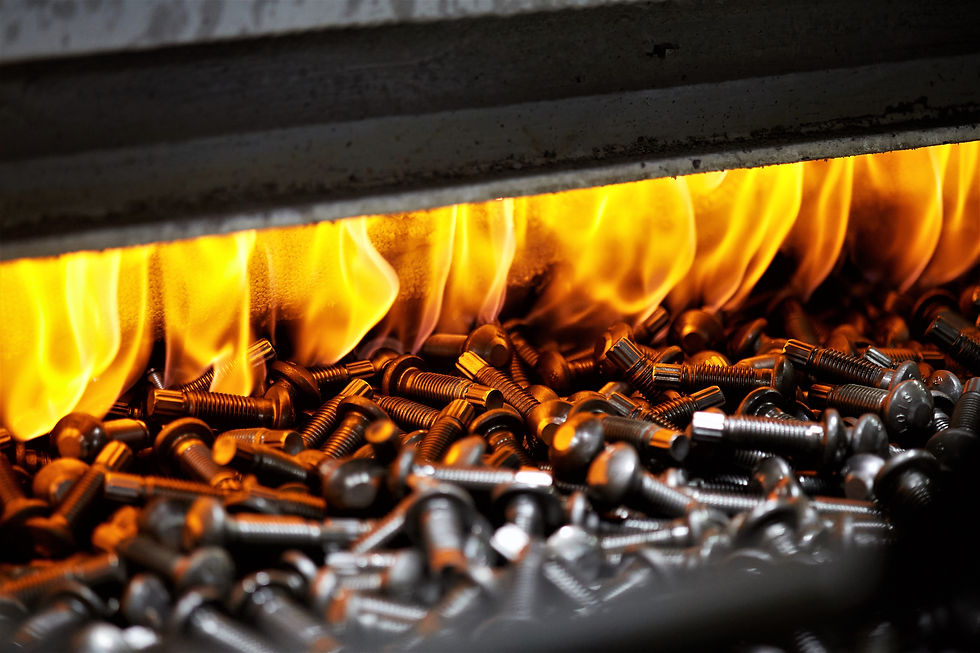Day 13 - Heat Treatment in Fasteners: How Science Turns Steel into Strength | Fasteners Training
- Lead Content Writer, Arslok

- Aug 12, 2025
- 3 min read

In the fasteners industry, strength is not an accident — it’s engineered.
Behind every high-performance bolt, screw, or nut is a precise process that transforms raw steel into a durable, load-bearing component ready to face extreme stress and environments.
That process is Heat Treatment — a science-driven technique that can be the difference between a fastener that performs under pressure and one that fails at the worst possible time.
# What is Heat Treatment in Fasteners?
Heat treatment is a controlled process of heating and cooling fastener materials (usually steel) to alter their mechanical properties — such as hardness, ductility, and tensile strength — without changing their overall shape.
By carefully manipulating temperature and time, manufacturers can create fasteners that are stronger, tougher, and more reliable for demanding industrial applications.
# Why Heat Treatment Matters
Fasteners are often used in high-stress environments — think of a bolt holding together a wind turbine blade, or a screw inside an aerospace engine. In these scenarios:
Strength ensures the fastener can withstand load without deforming.
Toughness allows it to absorb shock and vibration without cracking.
Fatigue resistance keeps it functional over millions of cycles.
Without heat treatment, even the best-designed fastener may fail prematurely — causing expensive downtime, safety hazards, and reputational damage.
# The Main Heat Treatment Processes for Fasteners
Annealing – Softens the metal for easier machining and forming.
Normalizing – Improves grain structure for better machinability.
Quenching & Tempering – Hardens the steel, then tempers it to balance hardness and toughness.
Case Hardening (Carburizing/Nitriding) – Hardens only the surface for wear resistance while keeping the core tough.
Each process is selected based on application requirements — for example, a fastener in an automotive suspension system may undergo quenching and tempering for high tensile strength, while a fastener for sheet metal may require only case hardening.
# Quality Control in Heat-Treated Fasteners
A proper heat treatment program involves continuous testing and certification, including:
Hardness testing (Rockwell, Brinell, Vickers)
Tensile and yield strength testing
Microstructure examination
Non-destructive testing (NDT) for cracks or defects
These steps ensure the fasteners meet global standards like ISO, DIN, ASTM, and SAE — critical for both domestic and export markets.
# Bridging the Knowledge Gap — Arslok Fasteners Training
In India’s fasteners industry, technical excellence must go hand-in-hand with market expertise. That’s where Arslok steps in.
Arslok is India’s #1 B2B brand-building partner for fasteners and industrial manufacturers — and we also specialize in Fasteners Training (both Technical and Sales).
Our Fasteners Technical Training covers:
Manufacturing processes (including heat treatment in depth)
Global standards and quality control
Material science for fasteners
Application engineering
Our Fasteners Sales Training ensures your sales team:
Speaks the language of engineers and procurement officers
Positions your brand as a solution provider, not just a supplier
Wins repeat business through authority and trust
# Meet Your Trainer — Maninder Singh Sond
With 22 years of experience in sales and marketing for fasteners, power tools, and industrial products, Maninder Singh Sond brings practical industry insights that bridge the gap between factory floors and boardrooms.
Under his guidance, fastener businesses have learned to:
Elevate their product knowledge
Command premium pricing through authority
Build long-term customer relationships in competitive markets
✅ If you want to train your technical or sales team to understand fasteners from manufacturing to market
—
📩 Message Arslok today and build a team that sells with knowledge, confidence, and impact.





Comments